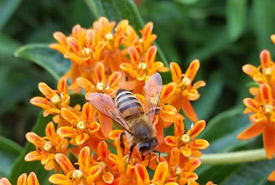This year, 2022, has been declared the Year of the Garden. It happens to coincide with a rising enthusiasm for gardening with native plants. For example here in Toronto we have an actively growing organization called the North American Native Plant Society. We might hope that a process to a possible intermarriage of enhanced plant biodiversity and
conventional ‘novel super-plant’ display could develop from these initiatives.
While experts on the poor pollinator and other biodiversity value of hybrids versus wild stock trot around the environmentalist and nature club speaker circuits and as yet rarely make it to gardening clubs, we who enjoy the sights and sounds of managed gardens of exotics are becoming more aware of the limited value these have in any process of returning human-planted landscapes to active centres of local biodiversity. Here in Southern Ontario we have a wonderful widely spread-out Royal Botanical Gardens with multiple locations that feature exotics and local hybrids that do well in our climate (e.g. we have the world’s biggest collection of lilacs and dogwoods). The RBC has made some attempt in recent times at featuring natural areas, lying as it does in a traditional oak savanna landscape. For a few years I lived in the milder climate of New Jersey where I visited several exotic gardens that had allowed the fecundity of local botany to embrace their landscapes by overlaying it into the non-natives.
My approach to my own garden is to conserve some native plants that spring up among my hybrids and exotics in an attempt to improve the potential for pollinators and other native-plant-dependant species to return. While there are native plant seed sellers, the many and varied soil types within my berms, woods and lawns make guessing what to try too hit and miss, so I concentrate on spotting what happens to sprout naturally and, if promising, to protect it from both aggressive invasive weeds like plantain and dandelions and rampaging hybrid perennials. I’ve had some success in creating a panorama of mixed beauty from both wild and garden plantings.
As there are some highly aggressive wild plants that can totally overrun a garden or pond once established, protecting cultivars from being squeezed out can on occasion be important. An example is a large swamp reed called a cattail that completely encircles still freshwaters if left to spread. It is important as a bird nesting site and water-fowl habitat, as well as having roots providing nutrition in a wilderness emergency (not my problem here yet!) but, if I don’t control it, many beautiful waterside and shallow-water plants, both native and imported, are soon smothered and gone.
Attempting a complete conversion of all gardens to native plant that some native plant apostles shoot for is Fools Gold it seems to me. Much of beauty and interest would be lost to us, plus the fact is that seasonal vegetables are virtually all non-native. Eurasian bulbs and shrubs brighten our spring well before any natives show, plus some lawn still has both social and aesthetic purpose and requires using Eurasian grasses (our native North American short and tall-grasses are not suitable for lawn).
Disappointingly I’ve yet to read of any seriously active promotion of a ‘hybrid’ approach to gardening that intertwines the variety and colour of human plant breeding with the best looking and/or most valuable to our ecology that Mother Nature has produced by herself.



